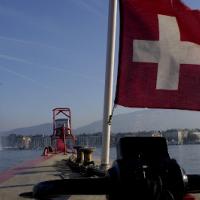The ‘Open Arms’ case: Reconciling the notion of ‘place of safety’ with the human rights of migrants
The work of the NGOs rescuing migrants in the Mediterranean Sea has been the subject of much controversy. One of the most recent cases regards the NGO Proactiva Open Arms: it has been accused of smuggling migrants during rescue operations at sea, and its rescue ship was impounded by the Italian authorities. This post examines the decision issued on 16 April 2018 by the pre-trial judge of Ragusa (Sicily) that ordered the release of the Open Arms vessel.
The relevance of this case is twofold. It obliquely tackles the legitimacy of the ‘pull-back’ agreement between Italy and Libya, as part of which the two states agree to collaborate with the aim of returning migrants to Libya, and which was recently challenged before the European Court of Human Rights (see this previous EJIL:Talk! post). Secondly, the decision, despite being just a pre-trial order, offers interesting insights into a contested area of international law which is gaining increase salience, i.e. the intersection between the Law of the Sea and the human rights of migrants.
This post argues that the order issued on 16 April is an important step forward in the definition of the notion of ‘place of safety’. International law merely states that people rescued at sea shall be delivered to a ‘place of safety’, but provides no definition of it (3.1.9. of the International Convention on Maritime Search and Rescue 1979, “SAR Convention”). The decision by the judge in Ragusa interprets ‘place of safety’ in accordance with the human rights of migrants, and rightly overcomes inappropriate distinctions based on migrants’ statuses.
The Law of the Sea and the obligation to rescue people in danger
Safety at sea is hardly a new concern. As soon as people began sailing seas and crossing oceans, they started dealing with the dangers which lie therein. To safeguard people’s lives, an ancient custom imposes a duty on seafarers worldwide to assist people in danger at sea. In the 20thcentury, this custom duty was codified into international treaties, making states responsible for safety at sea. According to the United Nations Convention on the Law of the Sea 1982 (UNCLOS), a state shall require the master of a ship flying its flag to ‘render assistance to any person found at sea in danger’ (Article 98). The International Convention for the Safety of Life at Sea 1974 (SOLAS) and the SAR convention provide that states are also responsible for coordinating search and rescue operations.
According to the SAR, a state is not relieved from its obligation to guarantee the rescue of people in danger at sea until they are delivered to a ‘place of safety’. Notably, there is no agreed definition of what a ‘place of safety’ is. This is problematic: the fate of people currently fleeing from Libya – and the outcome of the proceedings against Proactiva Open Arms – depend on its definition, as next section shows.
The definition of the concept of ‘place of safety’ (or the lack thereof)
The duty of delivering people to a ‘place of safety’ is an asymmetrical provision of international law. On the one hand, the SAR Convention states that a rescue is not complete until the persons are delivered to a ‘place of safety’; on the other hand, international law does not impose an unequivocal duty on states to allow the disembarkation of rescued persons on their territories. The principle of territorial sovereignty applies: states decide who can enter their territory and who cannot.
This asymmetry places a heavy burden on rescuing ships. They have a duty to swiftly disembark rescued people to a ‘place of safety’, but they might not be able to do so because of states’ refusal to let them in. The ‘Tampa affair’ was emblematic: in August 2001, the Norwegian ship Tampa was refused permission for days to disembark hundreds of rescued people on the Australian coast. The problems faced by the Tampa triggered international reactions, and ultimately led to the adoption of the 2004 Amendment to the SAR and the SOLAS conventions, which was a – modest – attempt to prevent similar situations from occurring again.
The SAR and SOLAS Amendment provides that the state coordinating the search and rescue zone where the rescue takes place has ‘the responsibility to provide a place of safety, or to ensure that a place of safety is provided’. This Amendment does not solve the existing ambiguities, because it does not provide for an obligationof any state to let the rescued people in. Moreover, some states, like Malta, have not accepted the Amendment. This ‘disagreement between Mediterranean states on the content of the duty to render assistance’ is highly problematic, and had repercussions on the Open Arm case and on the protection of migrants’ human rights.
The facts: Tensions between the Libyan coast guard and the NGOs in the Mediterranean Sea
Open Arms is one of the three vessels that Proactiva Open Arms, a Spanish NGO, uses to conduct its rescue missions in the Mediterranean Sea. Working in collaboration with the Italian coast guard, since July 2016 the NGO has saved 25,700 lives at sea. On 15 March 2018, the Maritime Rescue Coordination Centre in Rome informed the Open Arms vessel of the presence of a dinghy sailing international waters, 40 n.m. off Libyan coast. Open Arms was heading towards it, in order to verify its conditions, when the Libyan coast guard took over the coordination of the search and rescue operations, and ordered the NGO vessel to ‘stay out of sight’ (see the pre-trial order, at page 3).
The Open Arms did not comply with the instructions received from the Libyan authorities. Instead, the NGO vessel rescued the people from the dinghy, and then sailed towards a second dinghy that had been spotted in the meantime; while embarking people from this second boat, a Libyan coastguard unit arrived. A couple of hours of high tension followed, during which the Open Arms crew were verbally and physically threatened by the officials of the Libyan coast guard. Still, the NGO managed to complete the rescue of the people from this second dinghy (rescuing 218 people in total) and headed north, in search of a ‘place of safety’ where it could disembark the migrants.
Since a woman and her three-month old infant were in need of an emergency health treatment, the vessel was forced to stop in Malta and to disembark the two there. But, instead of asking Malta for authorization to disembark all of the rescued people, Open Arms continued its journey to Italy. According to the captain’s statements, they did so because Malta always denies migrants permission to land. After two days of navigation, Open Arms reached the Italian coasts and obtained authorization to disembark the rescued people in Pozzallo (Sicily). Shortly after the safe landing, the NGO was informed that the Catania prosecutor had charged two members of the Open Arms’ crew with belonging to a criminal organization and smuggling migrants. While the first accusation was quickly dismissed, the charge of smuggling stood, and the Open Arms boat was consequently impounded by the police.
The decision to release the Open Arms
The order concerning the pre-trial seizure of the Open Arms vessel focused on whether it was plausible to think that the defendants had committed the crime (the fumus commissi delicti test). In particular, the judge examined whether the conduct of the Open Arms crew, which refused to hand over the migrants to the Libyan authorities and brought them to Italy instead, shall be considered migrant smuggling. For its part, the NGO argued that they acted under a ‘state of necessity’ (Article 54 of the Italian criminal code): the unlawful conduct is justified by the necessity to protect the perpetrator or another person from an imminent and serious danger.
First, the order notes that migrants were not in imminent danger: their dinghies, despite being overcrowded, were not leaking and the weather conditions were good. Also, the Libyan coast guard was ready to intervene and rescue the people: Open Arms could have complied with the Libyan authority’s orders and handed over the migrants.
However, the decision also examined the second phase of the rescue: the delivery of the rescued people to a ‘place of safety’. Here, the pre-trial judge reached a different conclusion. The decision states that:
“it cannot be considered ‘safe’ a place where a person seriously risks being exposed to the death penalty, torture, persecution, sanctions or inhuman and degrading treatments, or his life or freedom would be threatened on account of his race, religion, nationality, membership of a particular social group or political opinion” (page 3).
The pre-trial judge, relying on official reports, held that Libya does not guarantee the necessary minimum level of human rights protection. Libya cannot be considered a ‘place of safety’ and, as long as the situation remains unchanged, the refusal of the members of the NGO to hand over the migrants to Libyan authorities and to bring them to Italy was justified by a state of necessity.
Comment on the Open Arms decision
The decision of the judge in Sicily is laudable for two reasons. First, the decision provides an interpretation of the concept of ‘place of safety’ that is in line with international human rights law. The pre-trial order, then confirmed in appeal, states that a ship master shall not only save people from the immediate danger of drowning, but must also take the rescued people to a place where they do not risk being tortured or persecuted.
Secondly, the decision does not fall into the trap of making misleading distinctions between refugees and other migrants. It recognizes to all the right not to be delivered to a place where they can be exposed to the treatments prohibited by Article 3 ECHR. This is important to counteract the common belief that only refugees have the right not to be deported to Libya, while other migrants, called ‘irregular’ or ‘economic migrants’, can be pushed back.
In this sense, the decision by the pre-trial judge in Sicily takes a step forward compared to the ECtHR decision in the case of Hirsi Jamaa. In this case, where the Court condemned Italy for its ‘push-back’ operations to Libya, the fact that the applicants were all in need of international protection was a crucial element. The Hirsi Jamaa decision was based on the fact that ‘no rule governing the protection of refugees was complied with by Libya’ (Hirsi Jamaa, at 125); therefore, the applicants risked being returned to Somalia and Eritrea, countries from which they were fleeing. These are valid considerations only for people entitled to international protection, and their relevance might be questioned for other migrants. Instead, the pre-trial order in the Open Arms case provided migrants at sea with a broader protection, by relying on human rights that apply to everybody, regardless of their status.


